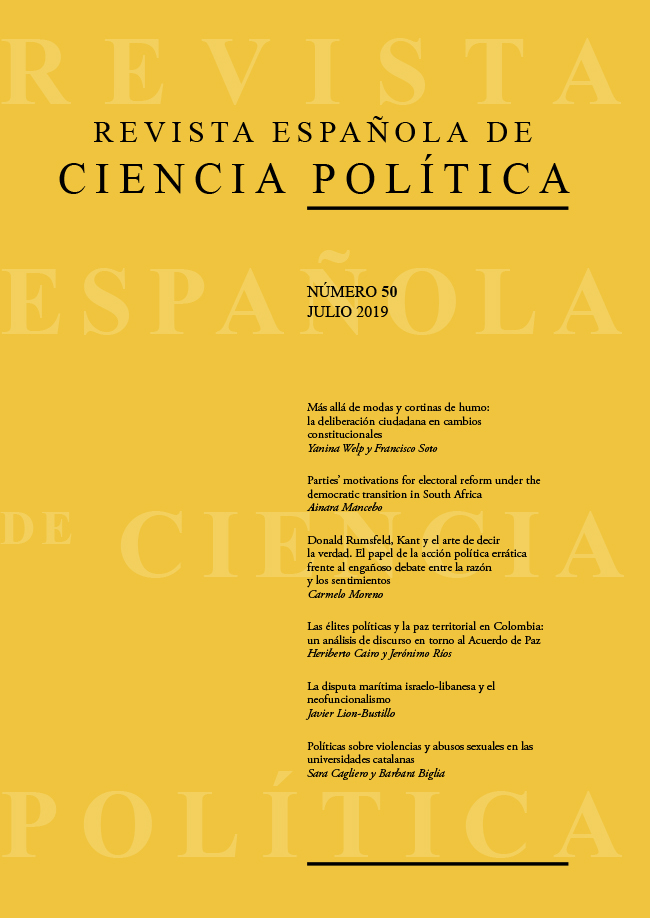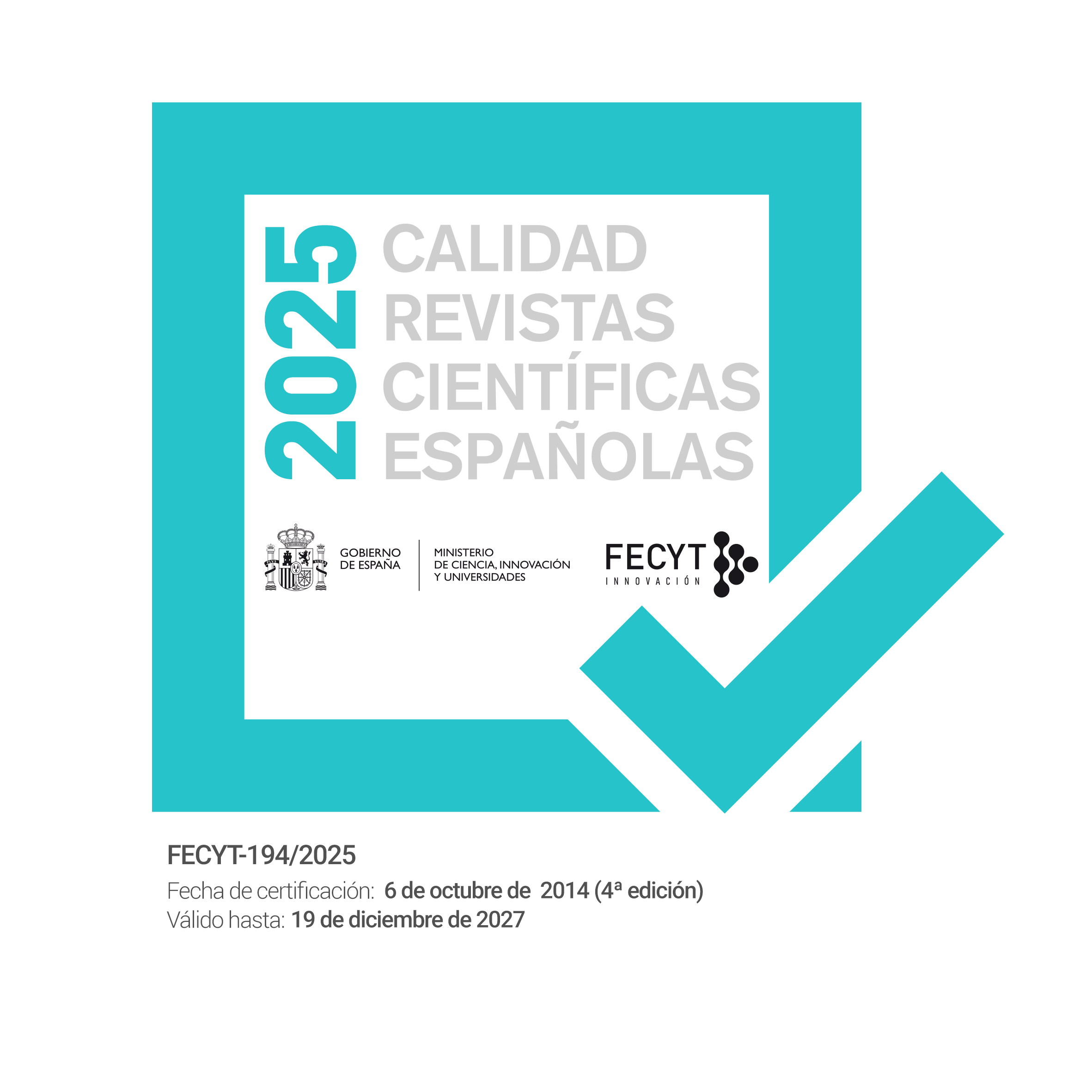Parties' motivations for electoral reform under the democratic transition in South Africa
DOI:
https://doi.org/10.21308/recp.50.02Palabras clave:
motivaciones de los partidos, cambio institucional, sistemas electorales, estrategias office-seeking, estrategias policy-seeking.Resumen
A principio de los años noventa, Sudáfrica inició su transición política en la que la transformación del sistema electoral fue uno de los puntos clave en la agenda de negociación. Las transiciones democráticas en este tipo de regímenes no son una lucha por el derecho de los actores políticos a mantener diversas ideologías políticas, sino sobre la extensión del sufragio que previamente había excluido a grupos de población. Siguiendo la literatura sobre las motivaciones de los partidos, analizo las razones múltiples de los actores políticos implicados en el diseño institucional de la reforma electoral. En este caso de estudio identifico explicaciones basadas en preferencias office-seeking y policy seeking en las estrategias de los partidos políticos participantes en la negociación del cambio institucional durante la transición democrática. Como resultado, Sudáfrica reformó la ley electoral utilizada durante el régimen autoritario, transformando un sistema electoral pluralista poco inclusivo en un sistema electoral proporcional altamente inclusivo en el nuevo régimen democrático.Descargas
Citas
Andrews, Josephine and Robert W. Jackman. 2005. “Strategic Fools: Electoral Rule Choice under Extreme Uncertainty”, Electoral Studies, 24 (1): 65-84. Available at: https://doi.org/10.1016/j.electstud.2004.03.002.
Arenstein, Rowley. 1990. “Multi-nationalism: How Many Nations in the New South Africa?”, Indicator South Africa, 7: 12-15.
Banducci, Susan A. and Jeffrey A. Karp. 1999. “Perceptions of Fairness and Support for Proportional Representation”, Political Behavior, 21 (3): 217-238. Available at: https://doi.org/10.1023/A:1022083416605.
Barkan, Joel. 2005. Emerging Legislature or Rubber Stamp? The South African National Assembly After Ten Years of Democracy. CSSR Working Paper, 134. Rondebosch, South Africa: CSSR.
Bawn, Kathleen. 1993. “The Logic of Institutional Preferences: German Electoral Law as a Social Choice Outcome”, American Journal of Political Science 37 (4): 965-989. Available at: https://doi.org/10.2307/2111539.
Benoit, Kenneth and John W. Schiemann. 2001. “Institutional Choice in New Democracies: Bargaining over Hungary’s 1989 Electoral Law”, Journal of Theoretical Politics, 13 (2): 159-188. Available at: https://doi.org/10.1177/0951692801013002002.
Benoit, Kenneth. 2004. “Models of electoral system change”, Electoral Studies, 23 (3): 363-389. Available at: https://doi.org/10.1016/S0261-3794(03)00020-9.
Benoit, Kenneth and Jacqueline Hayden. 2004. “Institutional Change and Persistence: The evolution of Poland’s Electoral System”, Journal of Politics, 66 (2): 396-427. Available at: https://doi.org/10.1111/j.1468-2508.2004.00157.x.
Benoit, Kenneth. 2007. “Electoral laws as political consequences: explaining the origins and change of electoral institutions”, Annual Review of Political Science, 10: 363-390. Available at: https://doi.org/10.1146/annurev.polisci.10.072805.101608.
Boix, Carles. 1999. “Setting the rules of the game: The choice of electoral systems in advanced democracies”, The American Political Science Review, 93 (3): 609-624. Available at: https://doi.org/10.2307/2585577.
Bowler, Shaun and Todd Donovan. 2015. The Limits of Electoral Reform. Oxford: Oxford University Press.
Brady, David and Jongryn Mo. 1992. “Electoral Systems and Institutional Choice: A case Study of the 1988 Korean Elections”, Comparative Studies, 24 (4): 405-429. Available at: https://doi.org/10.1177/0010414092024004001.
Bratton, Michael and Nicholas van de Walle. 1994. “Neopatrimonial regimes and political transitions in Africa”, World Politics, 46 (4): 453-89.
Budge, Ian and Michael Laver. 1986. “Office seeking and policy pursuit in coalition theory”, Legislative Studies Quarterly, 11 (4): 485-506.
Colomer, Josep M. 2005. “It’s Parties that choose electoral system”, Political Studies, 53 (1): 1-21. Available at: https://doi.org/10.1111/j.1467-9248.2005.00514.x.
Denemark, David. 2001. “Choosing MMP in New Zealand: Explaining the 1993 Electoral Reform”, in Matthew Soberg Shugart and Martin P. Wattenberg (eds.), Mixed-Member Electoral Systems: The best of Both Worlds? Oxford: Oxford University Press.
Dunleavy, Patrick and Helen Margetts. 1995. “Understanding the dynamics of electoral reform”, International Political Science Review, 16 (1): 9-29. Available at: https://doi.org/10.1177/019251219501600102.
Farrell, David M. and Ian McAllister. 2005. “Australia: The Alternative Vote in a Compliant Political Culture”, in Michael Gallagher and Paul Mitchell (eds.), The Politics of Electoral Systems. Oxford: Oxford University Press. Available at: https://doi.org/10.1093/0199257566.003.0004.
Faure, Murray. 1999. “The electoral systems issue in South Africa”, Occasional Papers, Johannesburg: Konrad Adenauer Stiftung.
Gouws, Amanda and Paul Mitchell. 2005. “South Africa: One party dominance despite perfect proportionality”, in Amanda Gouws and Paul Mitechell (eds.), The Politics of Electoral Systems. Oxford: Oxford University Press. Available at: https://doi.org/10.1093/0199257566.003.0017.
Horowitz, Donald. 1985. Ethnic groups in conflict. Berkeley: University of California Press.
Horowitz, Donald. 1991. A democratic South Africa? Constitutional Engineering in a Divided Society. Cape Town: Oxford University Press.
Howe, Herbert M. 1994. “‘The South African defence force and political reform’”, The Journal of Modern African Studies, 32 (1): 29-51. Available at: https://doi.org/10.1017/S0022278X00012532.
Huntington, Samuel P. 1991. The Third Wave: Democratization in the Late 20th Century. Norman: University of Oklahoma Press.
Katz, Richard S. 2005. “Why Are There so Many (or so Few) Electoral Reforms?”, in Michael Galloper and Paul Mitchell (eds.), The Politics of Electoral Systems. Oxford: Oxford University Press. Available at: https://doi.org/10.1093/0199257566.003.0003.
Lijphart, Arend. 1977. Democracy in Plural Societies. New Haven: Yale University Press.
Lijphart, Arend. 1985. Power-Sharing in South Africa. Berkeley: University of California.
Lijphart, Arend. 1990. “Electoral systems, party systems and conflict management in segmented societies”, in Robert Schrire (ed.), Critical choices for South Africa. Cape Town: Oxford University Press.
Lijphart, Arend and Don Aitkin. 1994. Electoral Systems and Party Systems: A Study of Twenty-Seven Democracies, 1945-1990. New York: Oxford University Press. Available at: https://doi.org/10.1093/acprof:oso/9780198273479.001.0001.
Luong, Pauline J. 2000. “After the break-up: Institutional design in transitional states”, Comparative Political Studies, 33 (5): 563-592. Available at: https://doi.org/10.1177/0010414000033005001.
Mandela, Nelson 1994. Long walk to freedom. London: Back Bay Books.
Meer, Fatima. 1993. The Codesa file: An institute for black research project. Durban: Madiba Publishers.
Nohlen, Dieter 1984. “Changes and choices in electoral systems”, in Arend Lijphart and Bernard Grofman (eds.), Choosing an Electoral System: Issues and Alternatives. New York: Praeger.
Norris, Pippa. 1997. “Choosing electoral systems: Proportional, majoritarian and mixed Systems”, International Political Science Review 18 (3): 297-312. Available at: https://doi.org/10.1177/019251297018003005.
Ostrom, Elinor. 1999. “Institutional rational choice: An assessment of the institutional analysis and development framework”, in Paul A. Sabatier (eds), Theories of the policy process. Cambridge: Westview Press.
Peters, B. Guy. 1999. Institutional theory in political science. The New Institutionalism. London: Pinter.
Piombo, Jessica and Lia Nijzink. 2005. Electoral politics in South Africa: Assessing the first democratic decade. New York: Palgrave Macmillan. Available at: https://doi.org/10.1057/9781403978868.
Radnitzky, Gerard. 1987. “Cost-benefit thinking the methodology of research: The economic approach applied to key problems to the philosophy of science”, in Gerard Radnitzky and Peter Bernholz (eds.), Economic imperialism: The economic approach. New York: Paragon House.
Rahat, Gideon. 2004. “The study of the politics of electoral reform in the 1990s: theoretical and methodological lessons”, Comparative Politics, 36 (4): 461-479. Available at: https://doi.org/10.2307/4150171.
Remington, Thomas F. and Steven S. Smith. 1996. “Political Goals, Institutional Context, and the Choice of an Electoral System: The Russian Parliamentary Election Law”, American Journal of Political Science, 40 (4): 1253-1279. Available at: https://doi.org/10.2307/2111750.
Renwick, Alan. 2005. “Modelling Multiple Goals: Electoral System Preferences in Hungary in 1989”, Europe-Asia Studies, 57 (7): 995-1019. Available at: https://doi.org/10.1080/09668130500301626.
Reynolds, Andrew. 1999. Electoral systems and Democratisation in Southern Africa. New York: Oxford University Press.
Rokkan, Stein. 1970. Citizens, Elections, Parties. Oslo: Universitetsforlaget.
Sakamoto, Takayuki. 1999. “Explaining electoral reform: Japan versus New Zealand and Italy”, Party Politics, 5 (4): 419-438. Available at: https://doi.org/10.1177/1354068899005004001.
Shugart, Matthew. 2001. “Electoral Efficiency and the Move to Mixed-Member Systems”, Electoral Studies, 20: 173-193. Available at: https://doi.org/10.1016/S0261-3794(00)00007-X.
Siaroff, Alan. 2003. “Spurious Majorities, Electoral Systems and Electoral System change”, Commonwealth and Comparative Politics, 41 (2): 143-161. Available at: https://doi.org/10.1080/14662040412331310131.
Sparks, Allister. 1995. Tomorrow is another country: The inside story of South Africa’s negotiated settlement. London: William Heinemann.
Spitz, Richard and Matthew Chaskalson. 2000. The Politics of Transition: A Hidden History of South Africa’s Negotiated Settlement. Oxford: Hart.
Strøm, Kaare. 1990. “A Behavioral Theory of Competitive Political Parties”, American Journal of Political Science, 34 (2): 565-598. Available at: https://doi.org/10.2307/2111461.
Strøm, Kaare and Wolfgang C. Müller. 1999. Policy, Office, or Votes? How Political Parties in Western Europe Make Hard Decisions. Cambridge: Cambridge University Press.
Vowles, Jack. 1995. “The Politics of electoral reform in New Zealand”, International Political Science Review, 16 (95): 95-115. Available at: https://doi.org/10.1177/019251219501600107.
Vowles, Jack. 2008. “Systemic Failure, Coordination, and Contingencies: Understanding Electoral System Change in New Zealand”, in André Blais (eds), To Keep or To Change First Past The Post? The Politics of Electoral Reform. New York: Oxford University Press. Available at: https://doi.org/10.1093/acprof:oso/9780199539390.003.0007.
Waldmeir, Patti. 1997. Anatomy of a miracle: the end of Apartheid and the birth of the new South Africa. New York: W. W. Norton and Co.
Publicado
Cómo citar
Número
Sección
Licencia
Derechos de autor 2019 Ainara Mancebo

Esta obra está bajo una licencia internacional Creative Commons Atribución-NoComercial-SinDerivadas 4.0.






